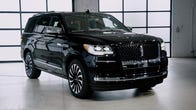A whole mess of all-electric Lincolns is under development.
LincolnFord is investing billions and billions of dollars to electrify its vehicle lineup, but Lincoln’s future product plans have been much murkier, until now.
On Thursday, Reuters reported the luxury division is hard at work developing a range of fresh EVs. If the news agency’s anonymous sources are correct, the Blue Oval’s luxury division is set to launch at least five new battery-powered SUVs through 2026.
This strategy is similar to what crosstown rival Cadillac is doing, though Lincoln has been much quieter about its plans. A couple years ago, Caddy hinted that it’s developing an Escalade-sized all-electric SUV as well as a battery-powered ultraluxury sedan called the Celestiq.
Lincoln’s vehicle onslaught is said to include all-electric models that will either augment or outright replace combustion-powered versions of the Corsair, Nautilus, Aviator and Navigator. According to Reuters, Lincoln’s first new EV will be an Aviator-sized utility vehicle built at Ford’s plant in Oakville, Ontario. Production is expected to start in late 2024 or early 2025.
Other all-electric Lincolns could be built at that Canadian facility as well. Starting in 2025 or 2026, battery-powered replacements for the small Corsair and midsize Nautilus SUVs could start rolling off the line, sharing similar underpinnings with the Mustang Mach-E utility vehicle. Enabling all this production, Ford’s Oakville factory received a $1.5 billion investment to switch from building combustion-powered vehicles to EVs.
An all-electric companion to the three-row Navigator SUV is said to be under development.
LincolnOn the larger end of the spectrum, in 2026, a battery-powered companion to the hulking Navigator is expected to enter production. This SUV should ride atop a dedicated electric truck architecture, one that would be shared with the next-generation Ford F-150 Lightning. Yes, the current Lightning electric truck isn’t even out yet and it’s already developing its successor.
Responding via email to a request for comment, Anika Salceda-Wycoco, manager of Lincoln communications, said the brand plans to offer a full portfolio of connected and electrified vehicles by 2030. When pressed for details about specific plans she said, “I won’t comment on speculation,” a standard response from public relations professionals when asked about future products.
In keeping with its quiet luxury tagline, Lincoln has been tight-lipped about its EV strategy. This report is an intriguing look behind the curtain, and if it’s accurate, the luxury brand could be farther along on its electric transformation than many might have thought.

